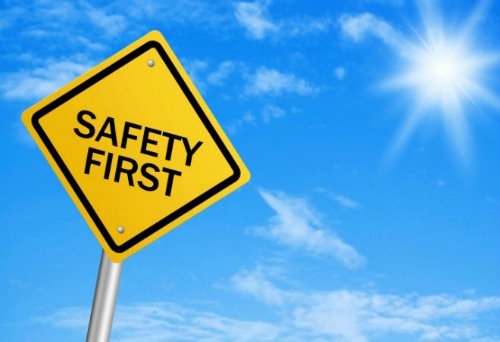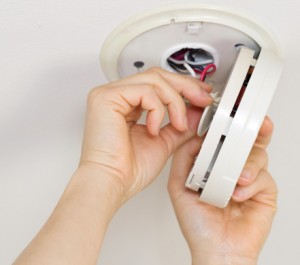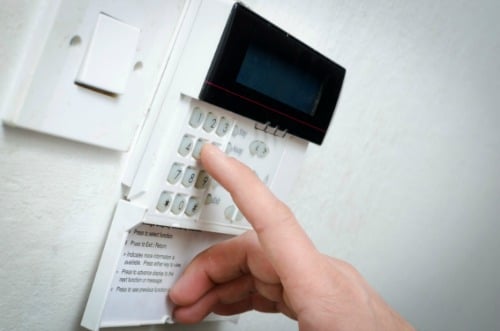As a Baltimore landlord, you are responsible for providing safe and healthy living conditions for your tenants. As such, it’s crucial to have a rental property safety checklist. This helps ensure your property is safe for all tenants and their guests. Continue reading below to learn about the importance of keeping your rental safe.

The Importance of Keeping Your Rental Safe
Under a country-wide law known as the implied warranty of habitability (or, as Baltimore calls it, “implied warranty of fitness“), landlords are required to maintain a rental property that does not endanger the life, health, or safety of tenants in any way. This includes, but is not limited to vermin or rodent infestation, lack of sanitation, lack of heat, lack of running water, or lack of electricity. Landlords must also protect their tenants from physical harm resulting from damaged property structures or criminal intruders.
Landlords and property management in Baltimore can easily provide safe conditions for all of their tenants by performing safety and maintenance inspections before and after lease terms. It also helps to conduct routine inspections throughout tenant occupancy to help address potential safety or health concerns before they become serious.
Today we will look at some of the major areas of concern that can be easily overlooked if not explicitly written out and inspected regularly. By following the provided checklist, you will be able to provide nothing less than safe properties for your tenants.
Rental Safety Checklist
Before inspecting your rentals, it’s helpful to come up with a checklist. This ensures you don’t miss any important safety issues or concerns within your property.
A few major points to check during your safety inspection include:
- Interior Safety
- Appliance Safety
- Exterior Safety
Interior Safety Check
The following set of interior safety checkpoints will be structural in nature. This is to ensure the physical safety of your tenants at all times.
- Doors– Interior and exterior doors must open and close properly to prevent easy criminal intrusions and possible fire evacuation hazards.
- Lights– Ensure that all lights can easily turn on and off. A delay may signal faulty wiring that could spark a fire.
- Outlets– All outlet panels must be secure and have no exposed wiring. Also, check for any broken or blackened outlets. This is to prevent a fire from starting or possible electrocution.
- Ceilings– Stains, cracks, or sagging ceiling sections may indicate water damage. Not only is this unsightly, but a possibly collapse on a tenant or mold contamination are severe health and safety concerns.
- Walls– Check the bases of all walls for possible vermin or rodent entry into the property. Another thing to note is any water damage that may be coming from the pipes within the walls.
- Floors– Sloping or uneven floors can be an early sign of structural damage or foundation problems. Stains and soft spots in the floor can also mean water damage or rot.
- Fireplace– If your property has a fireplace, clean it regularly to ensure proper ventilation when your tenants ignite the fireplace during their tenancy.
Appliance Safety Check
Though most appliances do not post any severe safety issues to your tenants should they break, you must check the ones that have the potential to cause actual harm. Here are a few things to keep a close eye on.

- Smoke and Carbon Monoxide Alarms – Baltimore has strict laws regarding smoke alarms and carbon monoxide detectors in homes, especially rentals. With the help of the Baltimore City Fire Department’s 311 Smoke Alarm Program, you can receive (and have installed for free!) 10-year lithium tamper-resistant smoke alarms on all levels of your home.
- Washer/Dryer –The buildup of lint and debris in either of these machines can damage the machine and cause a fire to ignite. Having a professional clear out the machine and ducts annually can help prevent this buildup from causing any safety hazards.
- Stove/Oven –Ensuring that an electric stove does not have faulty wiring and a gas stove does not leak gas is best for the health and safety of your tenants. These are fire hazards that you can prevent with a thorough inspection.
- Water Heater – In order to prevent scalding when hot water is in use, check your water heater’s temperature and make sure it is below 120° F.
- Plumbing – Ensure all plumbing throughout the home is working correctly to prevent water damage from leaks, mold contamination, and improper wastewater drainage.
Exterior Safety Check
It is just as important you inspect the exterior of your home. Your tenants will inevitably spend a significant amount of time walking to and from home and in the yard.
- Walkways and Stairwells – All railings must be secure and ready for use by your tenants. Walkways must be free of slipping hazards or debris. Additionally, the exterior should be well lit to discourage intruders from lurking in the dark.
- Lights –Every entrance point to your property should be well lit to deter criminal activity and improve visibility for tenants as they enter and exit the property.
- Landscape –Regularly trimming bushes and foliage can help prevent tripping hazards and prevent criminals from finding the perfect hideaway. If you have large trees with overgrown roots, ensure they are not damaging your property’s foundation or plumbing systems.
- Windows –All windows should close securely and have a locking mechanism. Sometimes window pins can help prevent windows from opening too wide should the lock be undone.
- Alarm Systems – If your rental property has an alarm system that is in use, inspecting that it works regularly is a good idea. Double-check all motion sensors and the call system to authorities. That way, if an intrusion occurs, the alarm system does its job and protects your tenants and your property.
- Roof Inspection –Deteriorating insulation, wood, and drywall materials puts your electrical, plumbing, and HVAC systems at risk. Not to mention rodent infestation or mold contamination that can also occur. Having a licensed professional conduct a roof inspection will give you the best results so you can manage any problem areas immediately.

Ensure Safety with Property Management Professionals
All rentals must pass the inspection of a licensed home inspector before any tenants begin a residency in the home. Enlist your favorite Baltimore property management team, Bay Property Management Group, to help you regularly inspect your home. We’ll ensure that it maintains the highest safety standards owed to every tenant that leases a property.
With knowledgeable staff on hand to answer all of your questions, and a team of professionals dealing only with property management, you can rest assured your property and your tenants will always be in good hands.
Forget the stress of inspecting your properties! Let Bay Management Group handle it for you while you enjoy the peace of mind that all landlords can only hope for. Contact BMG today if you need rental management services in Baltimore, Philadelphia, Northern Virginia, and Washington DC.
Please note that this checklist is not all-inclusive. There is no way to address every possible scenario that may occur with your specific Baltimore rental property. In addition, not all health hazards are readily visible to even the most experienced landlord.

What if your windows don’t open up at all. There’s no ventilation at all